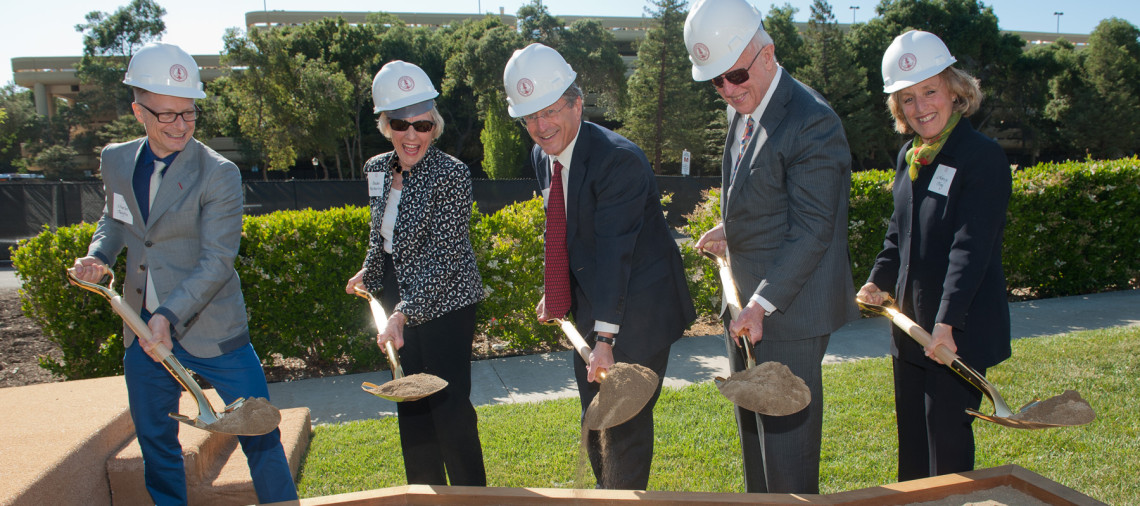 Steve Castillo
Steve Castillo
McMurtry Building Ceremony Marks Arts District Milestone
The McMurtry Building for the Department of Art and Art History is the latest project in the developing arts district.
For the second time this academic year, ground was broken in the developing arts district on a new building that convincingly promises transformation. The McMurtry Building for the Department of Art and Art History is officially under construction, just four months after the opening of Bing Concert Hall and seven months after the groundbreaking for the Anderson Collection at Stanford University. The McMurtry Building is scheduled to open in 2015.
“Once upon a time, close to 25 years ago …” So began Provost John Etchemendy’s McMurtry Building creation story as told to 240 guests on the south side of the Cantor Arts Center earlier this week at the groundbreaking ceremony. Etchemendy recalled a time when the Cantor Arts Center was cracked and closed following the 1989 Loma Prieta earthquake and its future uncertain. He and then chair of the Art Department, Wanda Corn, discussed the potential of the Cantor becoming a central player in the academic life of the university contingent upon it being a close neighbor to the existing art building.
For Nancy Troy’s remarks, click here.
For John Etchemendy’s remarks, click here.
“Back then, Wanda’s exciting vision of the co-location of art collection, art scholarship and art production was nothing more than a pipe dream. But even pipe dreams sometimes come true – at least when you have friends like the McMurtrys,” said Etchemendy.
The Cantor didn’t move all those years ago. Rather, it was rebuilt and expanded and is now one of the cornerstones of the arts district, welcoming Bing Concert Hall, the Anderson Collection and the McMurtry Building – all within three years’ time.
Burt and Deedee McMurtry were brought into the project around the launch of the Arts Initiative in 2006. After putting funds aside to be used for a yet-to-be-identified big project that might be difficult to fund, they were approached about an art and art history building. “On a flight back from a Stanford event in D.C. in 2007, John [President Hennessy] surprised us,” said Burt McMurtry, “by asking if we’d consider making the lead gift for the new building. It was important to him and it wasn’t clear how he could get it funded. Deedee and I thought about it for about five minutes and said yes.” And, he added, “We have loved being closely involved in architect selection, programming and design.”
The provost described the McMurtry Building as the key academic component of the arts district, and said he foresees it serving as the “linchpin that will activate the district day and night, and bring it into the heart of the university’s mission.”
For the first time, programs in art practice, design, art history, film and media studies, and documentary filmmaking will be housed under one roof, thus connecting the making of art with the study of art. The Art and Architecture Library, elegantly and strategically positioned as a central focal point in the building, links and reinforces making and study.
In the Art and Art History Department’s current location, chair Nancy Troy and her faculty have not been able to take full advantage of the rich collections at the Cantor or the museum’s expertise. Additionally, she has had to turn students away from some classes due to lack of space. “Turning students away is not exactly the best means to foster growing interest in the arts and humanities on campus,” she told guests at the groundbreaking. “With the opening of the McMurtry Building, all this will change dramatically. The benefits are going to be transformative and immediately perceptible to the larger university community.”
Charles Renfro of the architectural firm Diller Scofidio + Renfro described in his remarks a building that allowed him and his partners to play their nerd card and their artsy card equally. Speaking about the synergy he found with the McMurtrys, Renfro called them fellow artsy nerds. “We could see that they would be ideal clients – participants in the process, outspoken and opinionated, but respectful. They let us be who we are by being who they are. While sometimes seeming like parents, they are usually more like little kids – excited and indefatigable, full of joy, life and excited about the future.”
The collaboration between the architect, the art and art history faculty and the McMurtrys is a building project that will redefine arts education and stand out on the campus as a work of art. The McMurtry Building and the other new arts district buildings are significant markers of the Stanford Arts Initiative, and they reflect the central place Stanford believes the arts must have in life on campus and in a Stanford education.
The groundbreaking ceremony closed with Deedee McMurtry’s call to action: “Let’s go to work!” The provost led the McMurtrys, Renfro and Troy in a ceremonial digging into the soil with gold shovels to mark the beginning of a construction project that already has years of history.
“A groundbreaking sounds like a beginning, but this seems to be more like the middle,” said Burt McMurtry.
